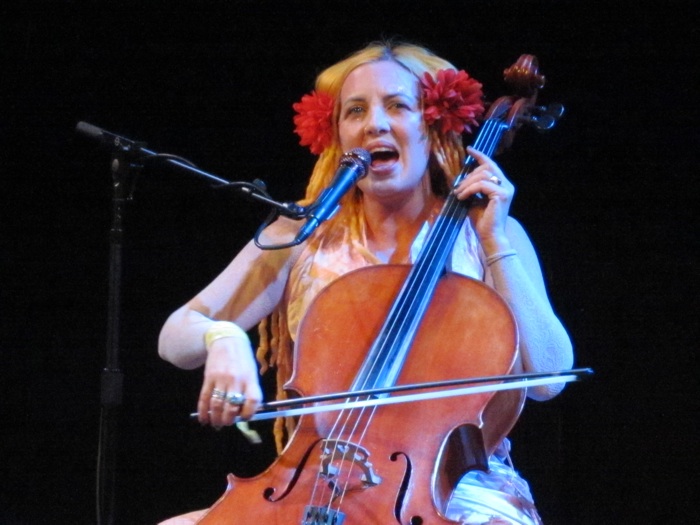Rasputina at the Great American Music Hall
Somewhere at the intersection of the society for creative anachronism and the Wave Gotik Treffen resides the cello-driven, chamber-rock trio Rasputina. Founded by multi-instrumentalist Melora Creager in 1992, the band has long straddled the line between whimsy and steel, with songs that range in topic from giants to vampires, orphans to infidels, E equals MC squared to 1816, “the year without a summer.”
Decked out in corsets, ruffles, and turn-of-the-last-century fantasywear, fronted by a woman who often speaks with a faux European-High Elvish accent, Rasputina is positioned as far as possible from the center of the pop music arcana without falling completely out of the deck. Eschewing categorization, the band floats effortlessly above petty pigeon-holing, embraced by steampunk creativists, glamour Goths, strings buffs, and plain old folk alike.
Playing for an attentive crowd at the Great American Music Hall on Sunday, show openers UK folk duo Smoke Fairies, was a sweet surprise to jaded ears. Two honey-tongued English roses, each bearing a guitar that they played gently but not tentatively, their finger-picking sure, their voices perfectly complementary.
Each song contained a shimmering undercurrent of regional inflection. The delicately balanced “Storm Song” lilted like an Irish ballad sung by Moya Brennan or Mairéad Ní Mhaonaigh, whereas the down-home slide guitar and husky vocals of “Living with Ghosts” evoked a haunting Appalachian melody with a hint of the Indigo Girls circa 1989 in the harmonies. Touring to support their first full-length album, Through Low Light and Trees (V2/Cooperative Music, 2010), Katherine Blamire and Jessica Davies have captured the attentions of Jack White and SXSW among others, securing some welcome street cred before their album even hit the shops this side of the pond.
Rasputina too has a newish album out, Sister Kinderhook (Filthy Bonnet, 2010), and mixed several of those songs into their concert set including “Sweet Sister Temperance” (an ode to one Emily Dickinson), “A Holocaust of Giants” (an ode to, well, giants), and one of my personal favorites, “Snow-Hen of Austerlitz,” a melancholy mountain ballad picked out on a half-sized banjo about a feral girl locked in a chicken coop. Older rockers, “Rats,” “Momma Was an Opium Smoker,” and “Saline, the Salt Lake Queen,” also found their way onto the setlist, as well as “Transylvanian Concubine,” (“the oldest song of the Rasputina canon,” Melora Creager pointed out).
In addition to Melora, the lead cellist and songstress of the band, the group’s current lineup includes longtime Creager collaborator, classically-trained cellist Daniel DeJesus, and Jill-of-all-trades Dawn Micheli who plays the drums in a more stately fashion than predecessors such as Cabin Fever’s Philosophy Major, or Jonathon TeBeest, which sucked some of the chaotic neutral vibe out of the harder numbers.
In truth, it was the slower, more thoughtful tunes that rendered the evening triumphal, including a forlorn cover of “Bad Moon Rising,” and the equally mournful “Watch TV”. Creager’s distinctive vocals bent and snapped like the flexible boughs of spring saplings, her breathy vibrato a perfect foil for the mellow rumble of her cello. And though it seems unlikely that the cello will ever replace the electric guitar as the favored instrument of pouting rockers, with Rasputina to blaze the path, it will at least remain a fanciful option for the musical intelligentsia.

